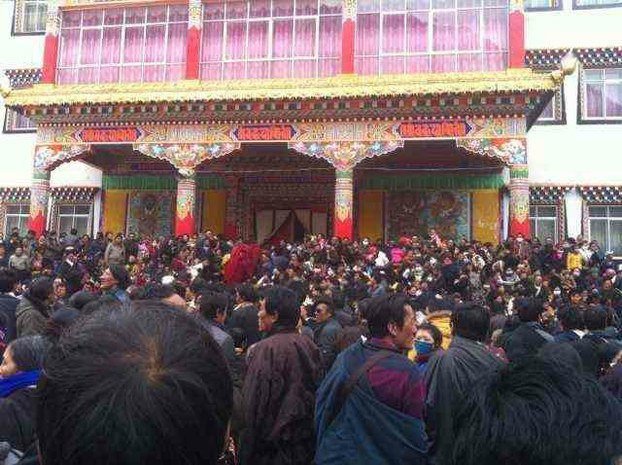




Chinese authorities are threatening to tighten controls at four Tibetan monasteries in a restive county of China’s Qinghai province, vowing to replace monastery managers suspected of challenging Beijing’s rule, according to local sources.
Tibetans living in Yulshul (in Chinese, Yushu) prefecture’s Tridu (Chenduo) county are concerned that any such changes could hinder religious practice and force monks to abandon the monasteries.
If Chinese officials take full charge of the monasteries, “discipline and religious activities will be adversely affected,” a Tibetan living in Tridu county told RFA’s Tibetan Service.
“Many monks will be forced to quit, and the monasteries could become empty,” RFA’s source said, speaking on condition of anonymity.
“For the last few months, Chinese officials have been visiting the monasteries in our area on a regular basis,” a second local source said, also speaking on condition of anonymity.
“They are insisting that the current [monastic] management committee members should be changed between June and August of this year, that new managers should be appointed, and that the officials should take the major role in the monasteries’ affairs,” he said.
'Separatist activities'
Principally targeted for new restrictions is Tridu county’s Nyatso Zilkar monastery, where monks in recent years have led protest marches and held prayer gatherings to honor self-immolators who have “sacrificed their lives for Tibet,” sources say.
“The Chinese authorities are interfering in the work of Zilkar monastery … accusing the management team of the monastery of involvement in separatist activities and pressing for their removal from management positions,” a Tibetan source told RFA last month.
“Members from the government work team have visited the monastery on a daily basis and poked their noses into all its activities. Chinese secret service personnel are also entering the premises disguised as monks or ordinary laypeople and are harassing the Zilkar monks,” he said.
But other local monasteries identified as Shelma, Drubgyu, and Lu have also come under heightened scrutiny, one source said.
“We are extremely worried, as this could have an impact on the monasteries’ activities,” he said.
Though Nyatso Zilkar, where over 500 monks are studying dialectics and other Buddhist subjects and engaging in religious retreats, could be especially harmed, "the other monasteries in the area could suffer the same fate,” he said.
In December 2013, Chinese security forces surrounded monasteries with paramilitary police and detained monks in Driru (Biru) county in the neighboring Tibet Autonomous Region when county residents defied orders to fly the Chinese flag from their homes, according to Tibetan sources.
Two years before, authorities in Tibet’s Chamdo prefecture had forced the return of monks and nuns to a monastery abandoned following a bomb attack on a government building, warning senior leaders that they could be shot if they fail to heed the order, sources said.
Sporadic demonstrations challenging Beijing’s rule have continued in Tibetan-populated areas of China since widespread protests swept the region in 2008, with 131 Tibetans to date self-immolating to protest Beijing’s rule and call for the return of exiled spiritual leader the Dalai Lama.
Reported by Kunsang Tenzin for RFA’s Tibetan Service. Translated by Karma Dorjee. Written in English by Richard Finney.